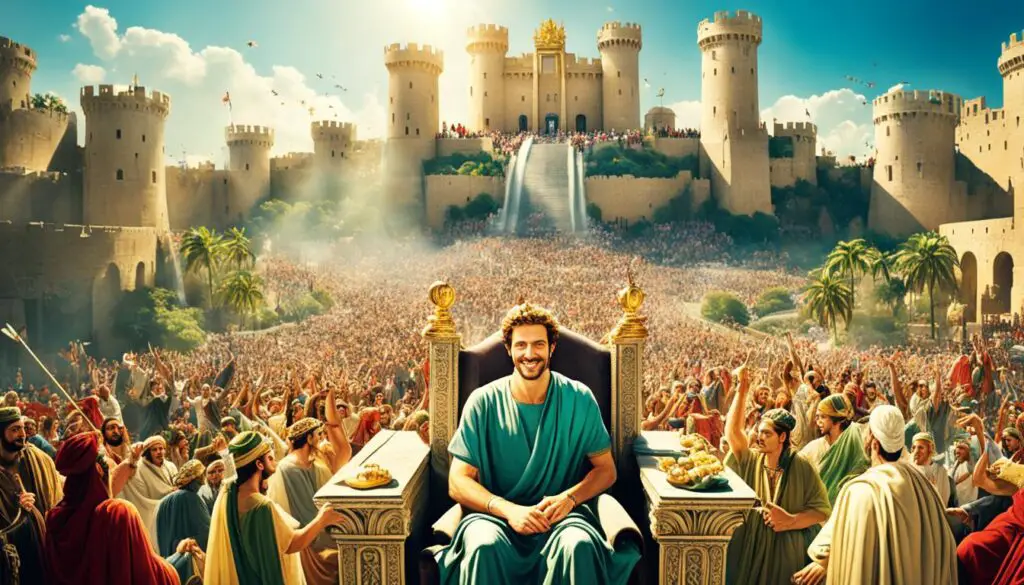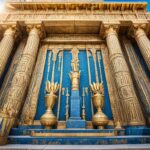David, the King of Israel, is a prominent figure in the Bible, known for his remarkable accomplishments and tragic flaws. From his humble beginnings as a shepherd to his reign as king, David’s life is filled with moments of triumph and moral struggles.
Perhaps the most well-known story of David is his encounter with Goliath, the Philistine giant. Despite being an underdog, David’s unwavering faith in God enabled him to defeat Goliath and become a symbol of courage and faith for generations to come.
In addition to his military prowess, David was also a gifted poet and musician. Many of the Psalms in the Bible are attributed to him, offering heartfelt expressions of worship, lament, and praise.
Key Takeaways:
- David, the King of Israel, was a multi-faceted individual, serving as a shepherd, soldier, poet, musician, and administrator.
- His achievements include the defeat of the Philistine giant Goliath and the establishment of Jerusalem as the capital.
- The Psalms written by David reflect his deep spiritual connection with God and continue to inspire believers.
- David’s legacy includes the Davidic Covenant, which set the foundation for the coming of the Messiah.
- His life teaches us the importance of courage, faith, and repentance in our own journey of faith.
David’s Rise to Power and Early Life
David’s journey to becoming king began when he was anointed by the prophet Samuel as the future king of Israel. He started as a young shepherd boy, but his potential for leadership was recognized by God. David initially served in Saul’s court as a musician and armor-bearer, and he became close friends with Saul’s son Jonathan. One of David’s notable feats during this time was defeating the Philistine giant Goliath, which brought him fame and popularity in Israel. However, Saul grew jealous of David’s success and attempted to kill him, forcing David to live as an outlaw and gather a group of followers. Eventually, Saul and Jonathan were killed in battle, clearing the way for David to become the king.
| David’s Achievements | Details |
|---|---|
| Defeating Goliath | David’s victory over the Philistine giant Goliath not only showcased his courage but also marked a turning point in his life, leading to his prominence in Israel. |
| Serving in Saul’s Court | David’s role as a musician and armor-bearer in Saul’s court allowed him to gain valuable experience and connections that would later shape his path to the throne. |
| Becoming Outlaw | After Saul’s jealousy and attempts to kill him, David had to live as an outlaw and rely on his ability to gather loyal followers in order to survive. |
| Clearing the Way to the Throne | Saul and Jonathan’s deaths in battle created the opportunity for David to ascend to the role of king, fulfilling the prophecy of his anointing by Samuel. |
David’s Reign as King
After assuming the throne, David reigned as king over a united Israel and Judah. He captured Jerusalem from the Jebusites and established it as his capital. David also brought the Ark of the Covenant to Jerusalem, symbolizing God’s presence with the people. He expanded Israel’s borders through successful military campaigns against the Philistines, Moabites, Arameans, and Edomites.
During his reign, David received a covenant from God, ensuring that his dynasty would endure forever and culminate in the coming of the Messiah. Despite his accomplishments, David faced personal challenges, including his adultery with Bathsheba and the subsequent murder of her husband. These events brought consequences and sorrow to David’s life.

David’s Psalms and Spiritual Legacy
David’s legacy goes beyond his political achievements, extending into the realm of spirituality through the Psalms he wrote. Many of these Psalms are attributed to David and serve as profound expressions of his deep relationship with God.
David’s Psalms encompass a wide range of emotions, from worship and praise to lament and despair. They provide a glimpse into David’s heart, showcasing his vulnerability, authenticity, and unwavering trust in God, regardless of the circumstances he faced.
One of the most beloved and well-known Psalms is Psalm 23, where David beautifully portrays God as a loving and caring shepherd who guides and protects His people. This Psalm resonates with believers throughout the ages, offering comfort, hope, and assurance of God’s presence.
“The Lord is my shepherd; I shall not want.” – Psalm 23:1
Furthermore, David’s covenant with God, known as the Davidic Covenant, holds significant spiritual importance. In this covenant, God promises that David’s dynasty and throne will endure forever.
This covenant plays a crucial role in understanding the fulfillment of God’s promises in Jesus Christ, who descended from the lineage of David. Jesus is often referred to as the “Son of David,” solidifying the connection between David’s legacy and the Messiah’s coming.

| Psalms of David | Description |
|---|---|
| Psalm 23 | A psalm of comfort and trust, depicting God as a loving shepherd. |
| Psalm 51 | A psalm of repentance and forgiveness, expressing David’s remorse for his sin with Bathsheba. |
| Psalm 139 | A psalm of God’s omniscience and omnipresence, highlighting David’s awe of God’s knowledge and presence. |
| Psalm 103 | A psalm of praise and thanksgiving, exalting God’s attributes and mercies. |
Through his Psalms and the Davidic Covenant, David leaves behind a spiritual legacy that continues to inspire and impact believers today. His honest and heartfelt expressions of faith serve as a model for how we can approach God with our joys, sorrows, doubts, and praises.
Next, we will explore David’s failures and the valuable lessons we can learn from them.
David’s Failures and Lessons Learned
Despite his many accomplishments, David, as depicted in the Bible, was not without his faults. One of his most infamous failures was his involvement in the story of David and Bathsheba, where he succumbed to temptation and committed adultery with Bathsheba while her husband, Uriah, was away at war. To cover up his wrongdoing, David arranged for Uriah’s death in battle.
This event brought immense sorrow and consequences to David’s life. However, when confronted with his sin by the prophet Nathan, David demonstrated deep remorse and wrote a powerful prayer of confession, known as Psalm 51.
“Have mercy on me, O God, according to your steadfast love; according to your abundant mercy blot out my transgressions. Wash me thoroughly from my iniquity, and cleanse me from my sin.” – Psalm 51:1-2
Through his failures, David teaches us the importance of taking responsibility for our actions, seeking forgiveness, and learning from our mistakes. His journey serves as a reminder that even great leaders are susceptible to moral failings and the need for repentance.

Lessons from David’s Life:
- We must be vigilant and guard against temptation.
- Transparency and accountability are essential in leadership.
- True repentance involves acknowledging our faults and seeking forgiveness.
- Learning from mistakes helps us grow and avoid repeating them.
- God’s grace and mercy offer redemption and the opportunity for a renewed life.
Conclusion
The story of David in the Bible is a captivating tale of triumphs and failures. As the second king of Israel and Judah, David’s life was filled with remarkable accomplishments and grave moral mistakes. From his humble beginnings as a shepherd boy, David rose to become a renowned warrior, poet, and king. He defeated the mighty Goliath, established Jerusalem as the capital, and expanded the borders of Israel through his military conquests.
However, David’s legacy is not without its blemishes. His most notorious failing was his sinful relationship with Bathsheba and the subsequent murder of her husband, Uriah. David’s actions serve as a powerful reminder of the consequences of moral misconduct and the importance of taking responsibility for one’s actions.
Despite his flaws, David’s impact continues to resonate through the Psalms he wrote. Through these heartfelt expressions of worship, lament, and praise, David’s legacy as a deeply spiritual individual endures. His covenant with God established the foundation for the coming of the Messiah, highlighting the significance of his role in biblical history.
Lessons can be learned from David’s life, both from his successes and failures. His journey teaches us the value of repentance and the power of God’s forgiveness. It reminds us that even great leaders can stumble, but true strength lies in acknowledging our shortcomings and seeking reconciliation with God.







